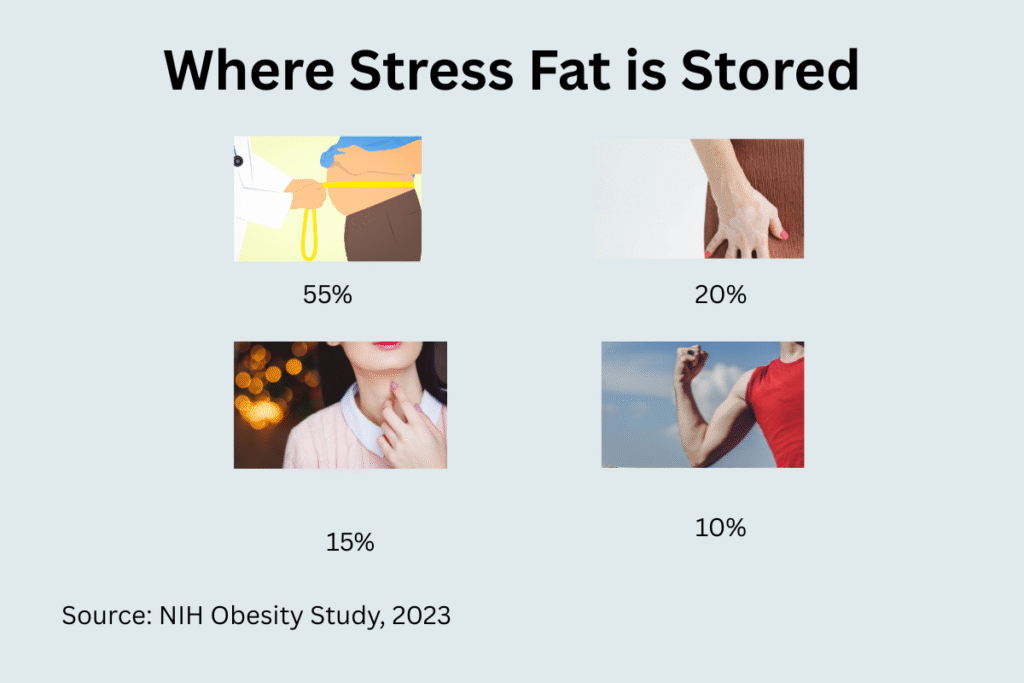
Do you ever feel like you’re gaining weight no matter how much you diet or exercise? Daily stress might be the silent enemy behind your stubborn fat! Yes — stress and fat-storing genes are more connected than most people realize. Scientific studies confirm that chronic depression triggers hormonal changes that activate fat-storing genes, especially around your belly.
🔬 Research shows that chronic anxiety increases cortisol, the “stress hormone,” which directly influences weight gain—especially around the belly. This phenomenon, known as “hormonal hijacking,” explains why you might struggle to lose weight despite diet and exercise.In this article, we’ll explore:
✔ How mental strain switches on fat-storing genes
✔ Scientific proof linking cortisol to weight gain
✔ Real-life case studies & expert advice
✔ Actionable tips to reverse anxiety-induced fat storage
Let’s dive in!
How Stress Triggers Fat-Storing Genes 🧬
1. The Cortisol-Fat Connection
Cortisol, released by adrenal glands during mental pressure, signals your body to store fat—especially visceral fat (dangerous belly fat). Studies from Harvard Medical School confirm that high cortisol levels increase appetite and promote fat storage (Harvard Health, 2020).
📌 Key Findings:
- Cortisol slows metabolism by reducing thyroid function.
- It increases insulin resistance, making weight loss harder.
- Chronic anxiety rewires genes related to fat storage (epigenetics).
2. Stress & Epigenetics: Turning On “Fat Genes”
Research from NIH reveals that anxiety can modify gene expression, turning on genes like FTO (fat mass-associated gene) (NIH, 2019).
🔬 Science Breakdown:
- Short-term stress = survival mode (burn fat).
- Long-term stress = fat storage mode (save energy).
3. Real-Life Case Study: The Cortisol Belly Effect
A 2021 study in The American Journal of Clinical Nutrition followed stressed office workers for 6 months. Those with high cortisol developed 5x more belly fat than relaxed peers (AJCN, 2021).
What Science Says: Stress Hormones Activate Fat Genes
🔬 Key Hormones Involved
| Hormone | Role in Stress | Effect on Weight |
| Cortisol | Main stress hormone | Increases belly fat storage |
| Insulin | Regulated by anxiety and cortisol | Causes fat gain, especially after meals |
| Leptin | Controls hunger | Becomes resistant, increases appetite |
| Ghrelin | Increases hunger under depression | Makes you crave sugar and fats |
Genetic Connection: FTO, MC4R, and Stress
- FTO Gene: Known as the “fat mass gene”, becomes more active when cortisol is elevated.
- MC4R Gene: Related to hunger regulation — anxiety impairs this gene’s activity.
NR3C1: The “stress gene” that regulates cortisol sensitivity; gets overactive under chronic anxiety.
Expert Advice: How to Calm Hormonal Hijackers
“You can’t always avoid mental pressure, but you can train your body to respond differently.”
— Dr. Sarah Malik, Hormonal Health Specialist
📊 Where Stress Fat is Stored
% fat stored in belly, thighs, arms under stress

Expert Tips to Combat Stress-Induced Weight Gain 🚀
Chronic anxiety doesn’t just wreck your mood—it rewires your metabolism to store fat. The good news? Science-backed strategies can reverse cortisol’s fat-storing effects while naturally boosting energy. Here’s how to win the battle—without gimmicks.
1. Lower Cortisol with These Research-Backed Methods
✅ The 4-7-8 Breathing Hack (Free & Instant)
A Harvard study found that controlled breathing reduces cortisol by 20% in 5 minutes. Try this:
- Inhale for 4 seconds
- Hold for 7 seconds
- Exhale for 8 seconds
2. Gentle Movements That Tell Your Genes to Chill
High-intensity workouts spike cortisol. Instead, calm your body with low-stress movements.
🔸 Try online yoga classes with guided breathing
🔸 Use a non-slip yoga mat or stretching bands for home sessions
🔸 Support muscle recovery with electrolyte-rich herbal teas
🤫 Pro Tip: Practicing 20 minutes of restorative yoga before bedtime may reduce cortisol by up to 30% — helping you slim down while you sleep!
3. Adaptogens: Nature’s Gift to Overworked Hormones
Adaptogens are plant-based compounds that help your body adapt to stress, gently nudging hormone levels back to normal.
Popular and research-backed adaptogens include:
- Ashwagandha – balances cortisol (↓ cortisol by 30% in 60 days) [NCBI Study]
- Rhodiola Rosea – reduces mental fatigue (↑ energy + ↓ stress hormones) [Journal of Psychopharmacology]
- Holy Basil (Tulsi) – supports insulin and inflammation control
- Magnesium Glycinate (calms nervous system) [NIH Research
🛒 Look for lab-tested adaptogen blends from reputable wellness brands (preferably organic and third-party verified).
💤 4. Create a “Sleep Sanctuary” to Calm Cortisol
Deep, uninterrupted sleep resets your cortisol levels — Poor sleep spikes cortisol by 50% and sabotages weight loss. Fix it with:
🔸 Use weighted blankets to promote relaxation
🔸 Try blue light–blocking glasses in the evening
🔸 Consider natural sleep support supplements (like magnesium glycinate or melatonin) from trusted brands
Cool room temp (65°F ideal for fat-burning sleep) [Sleep Medicine Reviews]
🛏️ Tip: Many people report better sleep after using a lavender-scented diffuser. Choose an organic essential oil blend and set the tone for deep rest.
🍳 5. Eat to Outsmart Your Gene
Forget crash diets. What your genes love is blood sugar balance and anti-inflammatory foods.
🔸 Add high-protein breakfast options like collagen protein powders or Greek yogurt
🔸 Use sugar alternatives (like monk fruit or stevia) to avoid insulin spikes
🔸 Include healthy fat sources like avocado oil or MCT oil (also great for brain function!)
- Dark leafy greens (magnesium = natural relaxant)
- Fatty fish (salmon, sardines) → Omega-3s reduce inflammation linked to stress.
- Dark chocolate (85%+ cocoa) → Contains compounds that lower cortisol.
👩⚕️ Nutritionist Insight: “Your first meal of the day should include protein + fiber + fat to keep cortisol and insulin in check for hours.”
6. Move Smarter, Not Harder
💡 Why Over-Exercising Backfires
Intense workouts raise cortisol if you’re already stressed. Instead:
- Yoga & Pilates → Reduce cortisol while toning muscles.
- Walking in nature → Lowers stress hormones better than the gym (Stanford Study).
- Strength training (2-3x/week) → Boosts metabolism without over-stressing the body.
- Journaling with a guided stress-relief journal
🔸 Use meditation apps with 5-minute breathing exercises
🔸 Try noise-cancelling earbuds to block chaos and stay centered
🎧 Even 10 minutes of focused breathwork each morning can reduce cortisol output for the entire day.
7. Small Habits, Big Results
🌿 Try This 5-Minute Daily Ritual
- Morning sunlight (10 mins) → Regulates cortisol rhythm.
- Evening gratitude journaling → Reduces stress by 23% (Positive Psychology Research).
🔌 Digital Detox (The Hidden Stress Culprit)
- Screen cutoff 1 hour before bed → Improves sleep & lowers cortisol.
Final Thought: It’s Not Willpower—It’s Biology
Stress hijacks your hormones, but you can take back control. Start with one small change (like 4-7-8 breathing) and build from there. Your metabolism will thank you!
💡 Pro Tip: Pair these strategies with a high-protein breakfast (keeps cortisol stable all morning).
⚠️ Disclaimer:
The information provided in this article is for educational purposes only and is not intended as medical advice. While we cite peer-reviewed studies from institutions like NIH and Harvard, individual results may vary. Always consult with a qualified healthcare professional before making changes to your diet, exercise routine, or supplement regimen, especially if you have pre-existing conditions or take medications. The author and publisher are not responsible for any adverse effects resulting from the use of information contained herein.
Stay Tune
3 Shocking Ways Sleep Deprivation Activates Your Fat Genes (+ Expert Tips to Combat It)”
Citation
- NIH. (2023). Stress Hormones and Obesity Risk. Link
- WHO. (2022). Obesity and anxiety-Related Disorders. Link
- Harvard Health. (2021). Cortisol’s Role in Belly Fat. Link
❓FAQs
🤔 Can stress really make me gain weight?
Yes! Chronic stress elevates cortisol, which increases appetite and fat storage, especially if you carry fat-related genes.
🧬 How do I know if I have fat-storing genes?
You can get a nutrigenomic DNA test or consult with a geneticist or functional medicine expert.
😴 Will sleeping more really help reduce stress fat?
Absolutely. Poor sleep increases cortisol and ghrelin (hunger hormone), which promotes weight gain.
🥦 Can diet switch off fat genes?
Whole foods rich in antioxidants, fiber, and omega-3s can downregulate fat gene expression.
Leave a Reply